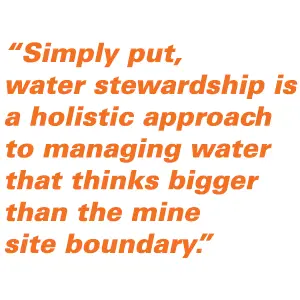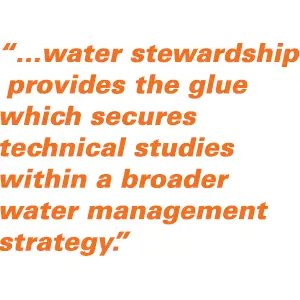Water is a basic human right and critical to mining. Mines operate in diverse ranges of water risk settings from water scarcity to flooding, and many share their catchments with other water users, such as local communities or other industries. Climate change is further exacerbating competition for water resources and, as a result, water is often a significant source of conflict between miners and host communities.
Water stewardship is therefore becoming an important strategy for managing water risks to business, addressing stakeholder concerns and earning social acceptance. And interest in water stewardship in mining is also growing rapidly from corporate stakeholders and investors, through to regulators, NGOs and local communities. This growing focus on water stewardship has been mirrored by a raft of governance and guidance from the UN, International Council on Mining and Metals (ICMM), Alliance for Water Stewardship (AWS), Global Reporting Initiative (GRI), Towards Sustainable Mining (TSM), Climate Disclosure Project (CDP) … and numerous others.
But what does water stewardship really mean beyond the “socially and culturally equitable, environmentally sustainable and economically beneficial” use of water (AWS, 2013)?
And why should mining companies care about water stewardship?
Simply put, water stewardship is a holistic approach to managing water that thinks bigger than the mine site boundary. It is about the mine seeing itself and its water use as part of a broader catchment, which can influence and be influenced by external factors. It considers transparent and consistent reporting of water use, collaborative engagement and partnerships with water stakeholders, and integration of water-related risks and opportunities back into the mine’s planning cycle.
Adopting a water stewardship-led approach allows companies to build trust through transparency and accountability, develop mutually beneficial relationships with other water stakeholders, and provide a framework for water risk identification and management. But beyond this, and recognising that water stewardship is a journey, those companies that are well developed along the water stewardship maturity path are increasingly finding the adoption of water stewardship principles add long-term value.
Through a water stewardship framework, mining companies can join up once disparate disciplines such as technical water studies, community engagement, risk management and corporate level strategic thinking, into a coordinated and holistic strategy for water management. For technical consultancies like SRK, the concepts behind effective water stewardship provide the glue which secures individual technical studies within a broader water strategy for a mining operation, ensuring an integrated and ultimately far more effective approach to water management.
One of the best ways to demonstrate what successful water stewardship looks like is through real-world case studies; the focus of this edition of SRK Insights. The case studies span water scarcity in the Middle East and evolving water and sanitation regulations in Central Asia, to catchment scale water balances in Finland and stakeholder engagement in Columbia.
At SRK, we’ve seen the focus of water stewardship evolve over the last decade from a mainly water accounting focus, through risk management, into a value-add process whereby the mining company in cooperation with other catchment users implement collaborative, joined-up water strategies.
The resources industry has always been relatively well advanced in understanding the technical elements of water management; however, it is increasingly clear that a solid technical foundation alone is not enough. Mining companies need to be able to demonstrate transparency and communicate a clear and defensible water stewardship message, backed up with robust data and studies.
Things are moving fast and companies who don’t take water stewardship seriously are at best missing out on mutually beneficial opportunities, but at worst are at risk of permitting difficulties, disruption to their social licence to operate and potential conflict.
SRK has a proven track record of working with corporate teams and operations on water stewardship challenges across a wide range of climatic and water risk settings, at every stage from exploration through to closure.


